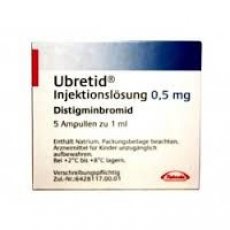Medical expert of the article
New publications
Preparations
Ubrethid
Last reviewed: 03.07.2025

All iLive content is medically reviewed or fact checked to ensure as much factual accuracy as possible.
We have strict sourcing guidelines and only link to reputable media sites, academic research institutions and, whenever possible, medically peer reviewed studies. Note that the numbers in parentheses ([1], [2], etc.) are clickable links to these studies.
If you feel that any of our content is inaccurate, out-of-date, or otherwise questionable, please select it and press Ctrl + Enter.

Ubretide belongs to the group of anticholinesterase agents, the active substance of the drug is distigmine bromide.
When taking ubretide, it is not recommended to drive or operate machinery, as the drug can affect reaction speed.
Ubretide is used no more than once a day; during a long course of treatment, a break is taken (one or two days) in order to prevent the accumulation of distigmine bromide.
Indications Ubrethid
Indications for the use of ubretide are as follows:
- Postoperative weakening of intestinal muscle tone.
- Excessive accumulation of gases in the intestines.
- Paralytic intestinal obstruction (against the background of decreased tone of intestinal myocytes).
- Atonic constipation.
- Megacolon.
- Atony of the urinary tract.
- Violation of the urinary bladder sphincter, as well as its hypotension.
- Rapid fatigue of striated muscles ( myasthenia ).
- Peripheral muscular paralysis.
Pharmacodynamics
Pharmacodynamics of ubretide: the effect of the drug occurs within an hour and a half after use. Ubretide increases peristalsis of the gastrointestinal tract, the tone of the urinary system, skeletal muscle tissue, causes relaxation of smooth muscles in the walls of blood vessels, slows the heart rate, moderately increases the functioning of the glands of external secretion.
 [ 7 ]
[ 7 ]
Pharmacokinetics
Pharmacokinetics of ubretide: after oral administration, it is metabolized by hydrolysis. It does not penetrate the blood-brain barrier. Metabolites are eliminated in the urine.
 [ 8 ]
[ 8 ]
Dosing and administration
Method of administration and dosage of the drug: ubretide is taken five milligrams daily, then the dose is increased to ten milligrams per day or, conversely, reduced to five milligrams once every two to three days, depending on the indications.
The tablets are taken on an empty stomach half an hour before meals.
The drug is administered intramuscularly at 0.5 mg, each subsequent administration is carried out no earlier than 24 hours later. In case of prolonged therapy, the drug should be stopped for two to three days after its use for five to seven days.
For elderly patients, as well as people suffering from vagotonia, the doses are calculated individually and can be reduced. In case of myasthenia, the dosage of the drug can be increased.
Use Ubrethid during pregnancy
The use of ubretides during pregnancy and breastfeeding is contraindicated.
Contraindications
Contraindications for the use of ubretide are as follows:
- Increased acidity of gastric juice.
- Increased tone of the intestines, biliary and urinary systems.
- Intestinal obstruction (excluding paralytic).
- Stomach ulcer.
- Duodenal ulcer.
- Inflammatory processes in the colon.
- Inflammatory processes in the small intestine.
- Convulsive disease.
- Idiopathic Parkinson's syndrome.
- Postoperative shock.
- Increased secretion of salivary glands.
- Decreased heart rate.
- Low blood pressure (hypotension).
- Chronic heart failure.
- Myocardial infarction.
- Increased levels of thyroid hormones.
- Inflammation of the iris of the eyeball.
- Tonic muscle spasms (Thomsen's disease).
- Convulsions caused by calcium metabolism disorders.
- Bronchial asthma.
- Pregnancy.
- Breastfeeding period.
- Occlusive disorders of peripheral circulation.
Side effects Ubrethid
Side effects of ubretide may cause nausea, vomiting, diarrhea, intestinal colic. Also, side effects of the drug ubretide include bronchospasm, increased secretion of the salivary glands, increased motor activity of the stomach and intestines, decreased heart rate, increased sweating, muscle spasms, pupil constriction, tremor, swallowing disorder, muscle twitching, myasthenia, dysmenorrhea.
Overdose
Overdose of the drug ubretide can cause symptoms such as nausea, vomiting, diarrhea, spasms of the gastrointestinal tract, increased intestinal peristalsis, increased secretion of the salivary glands, bronchospasm, decreased heart rate, constriction of the pupil, myasthenia, muscle twitching.
To neutralize the symptoms of overdose, 0.5–1 mg of atropine is administered subcutaneously or intravenously. If a cholinergic crisis develops, the patient must be hospitalized to provide assistance.
Shelf life
The shelf life of the drug ubretide is five years.
Attention!
To simplify the perception of information, this instruction for use of the drug "Ubrethid" translated and presented in a special form on the basis of the official instructions for medical use of the drug. Before use read the annotation that came directly to medicines.
Description provided for informational purposes and is not a guide to self-healing. The need for this drug, the purpose of the treatment regimen, methods and dose of the drug is determined solely by the attending physician. Self-medication is dangerous for your health.

